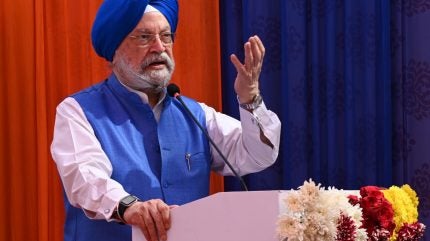
India is ready to continue purchasing relatively cheap oil from Russian companies authorised to do so, with the Asian nation ready to simply buy from the cheapest seller.
During an interview with a US media organisation at Houston’s GasTech conference, Oil Minister Hardeep Singh Puri confirmed that India is willing to procure oil and gas at the most competitive prices from any source.
Sanctions imposed by Western countries on Russia due to its conflict with Ukraine have limited not only the price Russia can demand for its crude oil but also the markets it can sell to. Russia has since pivoted its exports to India and China, and away from Europe.
In late August, it was reported that Russia’s oil exports to India surpassed those going to China, although Chinese refiners backing away from Russian oil may have spurred the move.
Russian crude oil accounted for 44% of India’s overall imports in July, according to market data compiled by several US news outlets. This equates to just over two million barrels a day (mbbl/d), more than 4% higher than the previous month and 12% above the year-ago figure. China’s oil imports from Russia in July were 1.76mbbl/d.
According to a US media source covering the event, the minister said that if ”an entity is not under sanctions, there is no question I will buy from the cheapest supplier”.

US Tariffs are shifting - will you react or anticipate?
Don’t let policy changes catch you off guard. Stay proactive with real-time data and expert analysis.
By GlobalDataHe mentioned that European nations and Japanese companies are making some purchases from Russia, so India is not the only country still buying crude oil.
India is among the largest energy consumers worldwide, importing 88% of its oil requirements. Puri anticipates an increase in energy consumption, with a greater emphasis on natural gas and renewable sources.
In February, the International Energy Agency (IEA) said India is forecast to be the single-largest source of global oil demand growth from 2023 to 2030, narrowly ahead of China.
The body said that the country’s demand will reach 6.6mbbl/d in 2030, up from 5.5mbbl/d in 2023.
“India’s oil consumption is set to increase faster than other countries’ [because the] country is still in the initial stages of economic development,” it said at the time.
India, currently the world’s third-largest oil consumer and importer, has an annual refining capacity of approximately 252 million tonnes, or 5.04 million barrels per day (bpd), and is aiming to increase its capabilities.
In 2023, India declined to adhere to the $60 price for Russian seaborne oil. On 7 December, India’s External Affairs Minister Subrahmanyan Jaishankar informed the government that Indian refiners would continue to seek the best options in the country’s interest.
However, in April, a US Government official mentioned at an event discussing phase two of the price cap in New Delhi that Russia’s discounted oil to India is assisting in capping the West’s sanctions on Russian oil following the invasion of Ukraine in February 2022.
“Now, projects are in place to take it up to 300 million metric tons per annum (600,000bpd). We are brainstorming whether we should take it to 400 or 450,” the official added.
The surge in international prices for liquefied natural gas (LNG) following Russia’s invasion of Ukraine has hindered India’s progress in embracing this important hydrocarbon.
India aims to raise its gas consumption to 15% of the energy mix by 2030, a significant increase from the current 6%, but the pace of this transition is contingent on price fluctuations.
“If gas prices were to stabilise and come down, then its share in our energy mix will go up,” Puri said at the event, as reported by US media outlets.
The Indian Government and private businesses have invested in LNG projects and plan to continue seeking opportunities to invest internationally.



